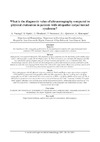Identificador persistente para citar o vincular este elemento:
https://accedacris.ulpgc.es/jspui/handle/10553/7181
| Título: | What is the diagnostic value of ultrasonography compared to physical evaluation in patients with idiopathic carpal tunnel syndrome? | Autores/as: | Naranjo, Antonio Ojeda, Soledad Mendoza, Dolores Francisco, Félix Quevedo, Juan C. Erausquin, Celia |
Clasificación UNESCO: | 32 Ciencias médicas | Palabras clave: | Carpal tunnel Neurophisiology Ultrasonography |
Fecha de publicación: | 2007 | Publicación seriada: | Clinical and Experimental Rheumatology | Resumen: | OBJECTIVE: Our hypothesis is that sonography performed by the rheumatologist in patients with suspected carpal tunnel syndrome (CTS) has higher diagnostic value compared to physical evaluation. METHODS: Adult patients with suspected idiopathic CTS, defined by sensory symptoms over the distribution of the median nerve with or without positive results with the Phalen and/or the Tinel's maneuvers were included. The diagnosis of CTS was indicated by typical symptoms daily for at least 3 months and a positive nerve conduction study. One rheumatologist unaware of the clinical and electrodiagnostic results performed an ultrasound examination of the median nerve for the area ranging from the inlet to the outlet of the carpal tunnel. Mean cross-sectional area at each level, flattening ratio and bowing of flexor retinaculum were obtained. RESULTS: Sixty-eight patients with 105 affected wrists were examined. Tinel's and Phalen's signs had a closer sensitivity (73% and 67% respectively) and specificity (40% and 30% respectively). The best swelling nerve cut-off by sonography was 9.7 mm2 at the tunnel inlet, with a sensitivity of 86%, a specificity of 48% and accuracy of 77%. A 100% positive predictive value was reached with a cross-sectional area of 13 mm2, involving 33 hands (31% of the whole sample). Maximal cross sectional area and the measurement of flexor retinaculum had an accuracy of 72% and 73% respectively. Combination of physical maneuvers and sonography not yielded more accuracy than cross-sectional area itself. CONCLUSION: In patients with clinical history of idiopathic CTS and positive nerve conduction study, sonography performed by the rheumatologist has higher diagnostic value than physical maneuvers. | URI: | https://accedacris.ulpgc.es/handle/10553/7181 | ISSN: | 0392-856X | Fuente: | Clinical and Experimental Rheumatology[ISSN 0392-856X],v. 25, p. 853-859 |
| Colección: | Artículos |
Citas SCOPUSTM
49
actualizado el 08-jun-2025
Citas de WEB OF SCIENCETM
Citations
39
actualizado el 25-feb-2024
Visitas
416
actualizado el 16-ene-2026
Descargas
117
actualizado el 16-ene-2026
Google ScholarTM
Verifica
Comparte
Exporta metadatos
Este elemento está sujeto a una licencia Licencia Creative Commons

